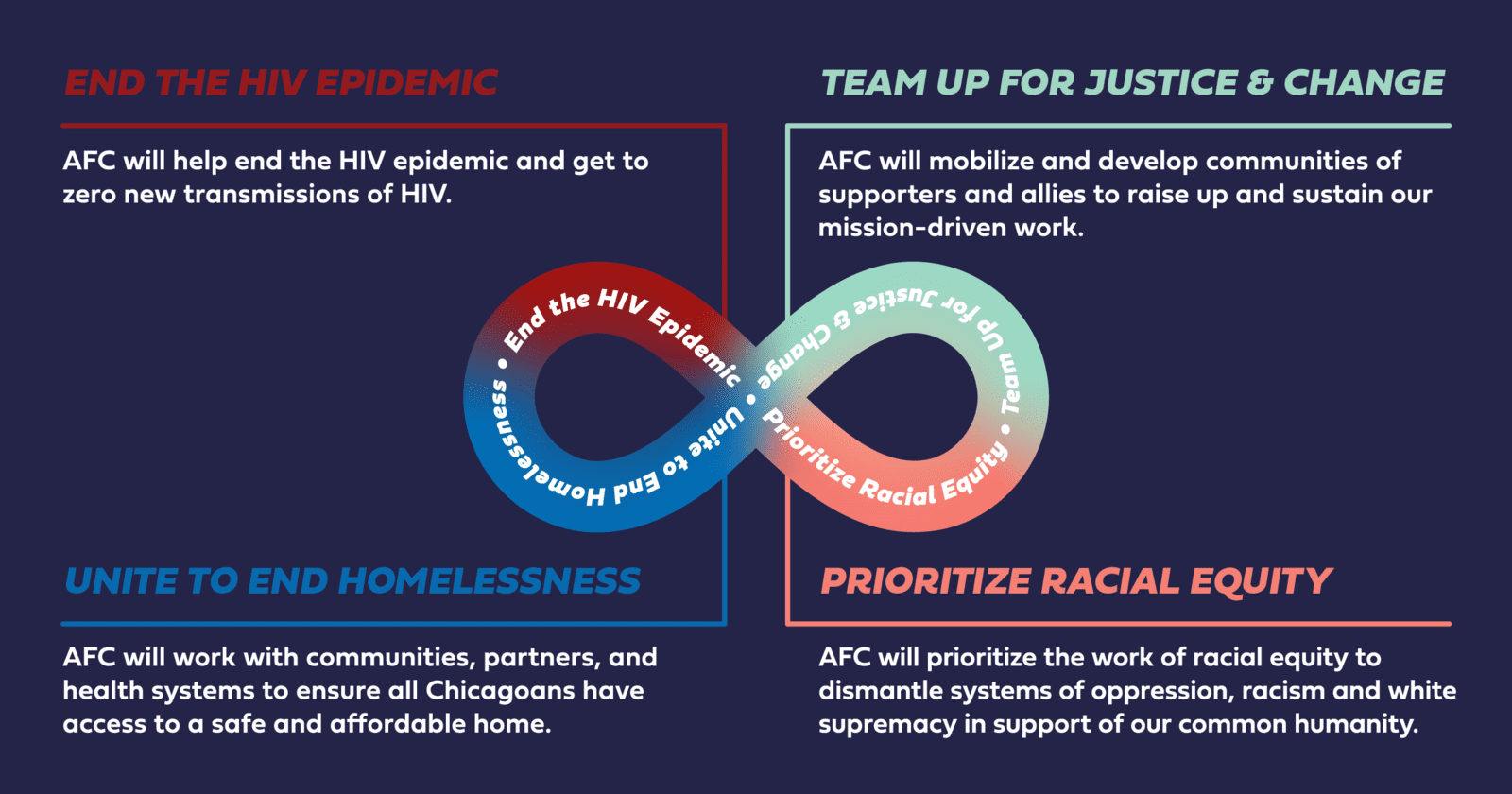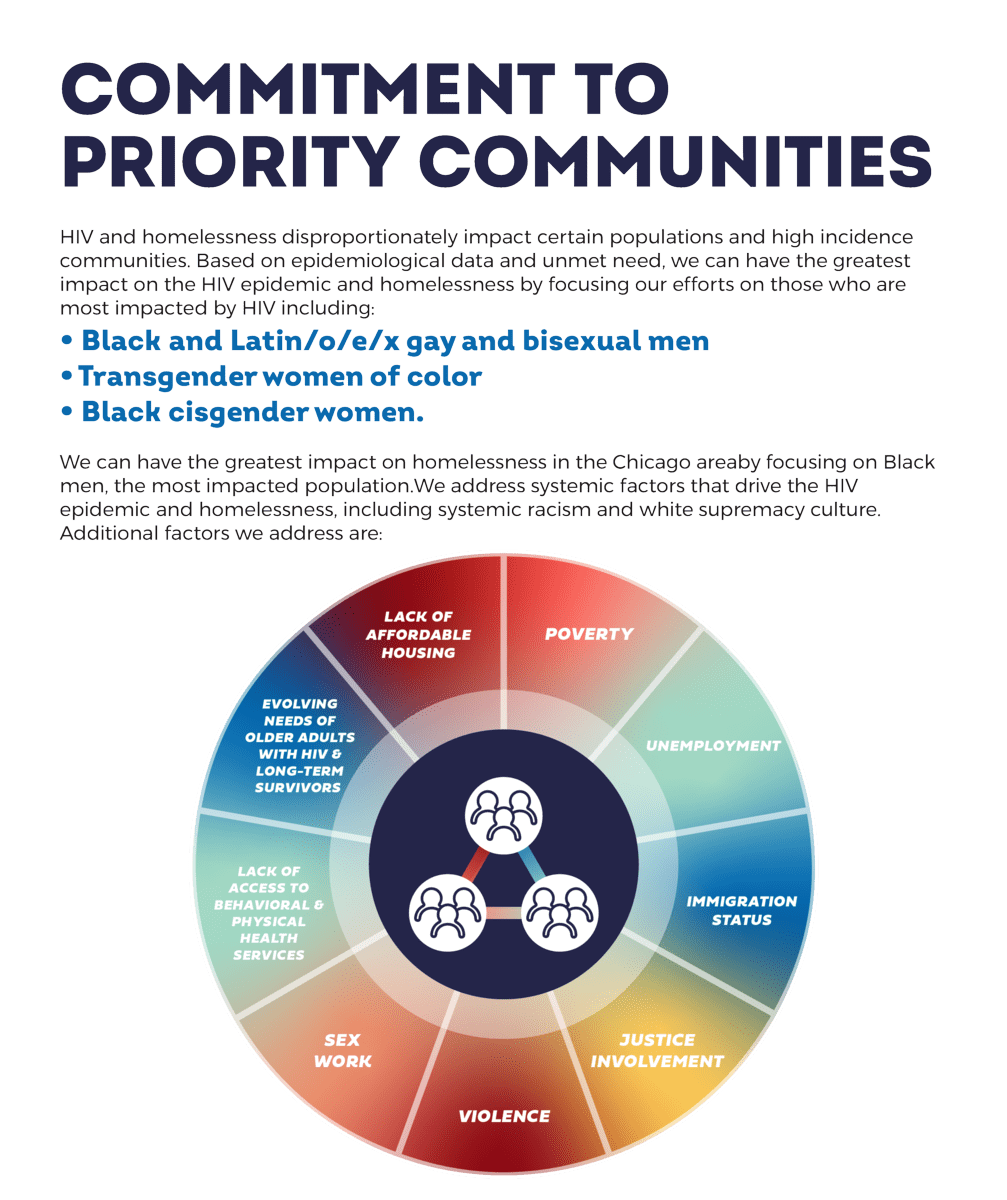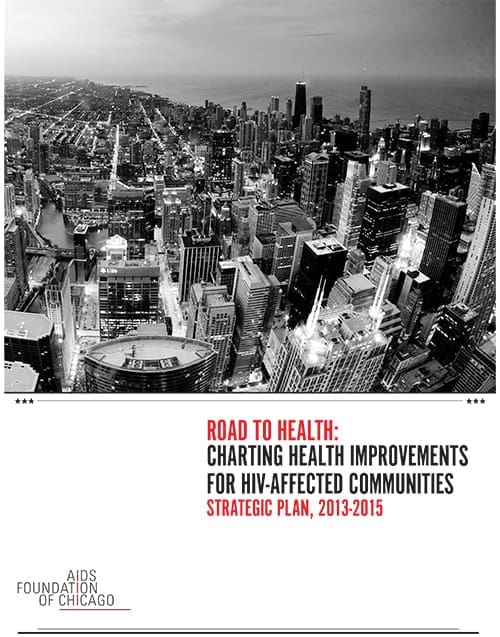This year, AIDS Foundation Chicago (AFC) rolled out its 2022-2024 Strategic Plan with four strategic priorities: ending the HIV epidemic; prioritizing racial equity; uniting to end homelessness; and teaming up for justice and change. The plan was developed over several months in a process co-led by staff ambassadors, staff leaders, and the board. With fewer than two months left in the year, AFC’s staff have completed 90% of the plan’s actions due this year. Learn how we developed our strategic plan here.

End the HIV Epidemic
As part of AFC’s work to end the HIV epidemic and get to zero cases of HIV, AFC provides critical supportive services to individuals throughout Chicago and is leading organizations throughout the state to aligning with the state’s Getting to Zero Illinois plan.
- Through the strategic plan, AFC launched a multi-year project to train Ryan White case managers and other providers to help our system better serve the complex needs of adults who are aging with HIV. The goal is to develop an extensive training curriculum, both in person and virtually, to better equip providers as the population living with HIV continues to grow older.
- The Ryan White Program at AFC continues to address the unmet health needs of persons living with HIV and AIDS. 86.4% of people in AFC’s Ryan White case management program are virally suppressed, a 1.4% increase since the start of the year. 73% of clients in AFC’s housing programs are virally suppressed, an increase of 1% since the start of the year. Viral suppression supports one’s individual health as well as community health, as someone who is virally suppressed is healthier and cannot pass HIV sexually to their partners – this is known as U=U or Undetectable=Untransmittable.
- While PrEP is incredibly effective, too few people who need it are taking it. AFC successfully led advocacy for state legislation (HB 4430) that expands access to PrEP by allowing pharmacists to dispense it, along with post-exposure prophylaxis (PEP), which can prevent HIV infection after exposure. Governor Pritzker signed the bill into law on July 22, 2022.
- AFC, in partnership with Center on Halsted, launched a marketing campaign to promote the HIV Resource Hub on mass transit on the South and West sides to ensure that individuals have a centralized website and phone number to access services. The HIV Resource Hub provides comprehensive information and direct connections to HIV services for people living with and vulnerable to HIV, including HIV testing and PrEP support, mental health counseling, medical transportation, primary care, housing navigation and more.
- AFC understands the necessity of expanded behavioral health services, including mental health and substance use support. However, like so many organizations, staff vacancies have been a challenge. We are striving to fill the positions as soon as possible.
Uniting to End Homelessness
As a people-first organization, AFC works with communities, partners and health systems to ensure all Chicagoans have access to a safe and affordable home.
- To increase the number of units dedicated to people experiencing homelessness across Chicagoland, AFC successfully led efforts to advocate for increased funding for HIV-dedicated units. An additional 125 homes were added to the system.
- More affordable housing units are needed in areas where clients want to live, including in opportunity neighborhoods on the North Side of Chicago. With the City of Chicago and partners, AFC launched a CTA marketing campaign to recruit landlords.
- The Getting to Zero IL (GTZ IL) plan aims to increase by 50% the number of housing units dedicated to people living with HIV in Chicago and statewide. With a consultant and support from partner organizations, AFC benchmarked the number of housing units in the Chicago area and downstate. Since 2017, the baseline year, 124 units were added downstate, a 50% increase, meaning Illinois has met the goal. The 391 units added in the Chicago area reflected an increase of 36%, which is close to the goal. Advocacy will continue.
- AFC is anticipating a potential challenge and setback in housing, however, as the much- needed $150M federal increase for Housing Opportunities for People with AIDS (HOPWA) for federal Fiscal Year 2023 is looking unlikely. Advocacy will continue.
Prioritizing Racial Equity
AFC prioritizes the work of racial equity to dismantle systems of oppression, racism and white supremacy in support of our common humanity. AFC does this by fostering an intentional organizational culture of inclusion and belonging for community, clients, staff and board members.
-
Part of AFC’s commitment to racial equity involved an assessment of staff pay to determine if there are systemic differences by race and other dimensions. This year AFC and CHH completed its current pay and benefit compensation market survey and invested $1 million to increase AFC & CHH salaries to market rates. By providing all staff with equitable, competitive, and transparent compensation, including salary and benefits, AFC is one step closer to achieving its goal of racial equity.
-
To ensure all staff have the same knowledge of terms and concepts related to racial equity, and can put that knowledge into practice, AFC developed a series of racial equity trainings with consultants. The trainings will be rolled out throughout 2022. The first, Foundations of Racial Equity, took place in October 2022.
-
Increasing funding for Black and Latine-led partner organizations is an important goal in the racial equity plan. AFC benchmarked FY 21 funding to these vital community-based organizations at $2.3 million and will aim to increase that funding by at least 10% in FY 22.
-
It is challenging for individuals to achieve their full health potential if program forms, and information are not available in their native language. AFC has launched an assessment of the most commonly used forms and will begin to translate them into Spanish.
-
As part of AFC’s fundraising/development objectives within the Race Equity Action Plan, AFC hosted a fundraiser in support of the Learning Circle Collaborative cohort (all Black and Latine-led HIV organizations) to raise funds and awareness of the agencies within the cohort and to support Black-owned businesses. The event was held at the L1 RETAIL STORE at 319 E. Garfield Blvd. L1 is a new creative business accelerator program, and retail store housing three South Side-based, Black-owned businesses on the Arts Block inside of the historic first “L” station along historic Garfield Boulevard in Washington Park, operated and managed by Arts + Public Life, an initiative of UChicago Arts. The event raised more than $10,000. All net proceeds will be donated directly to the organizations within the LCC cohort. See event photos here!
-
A keynote to highlight in AFC’s plan for racial equity is the launch of its first ever joint Board and Staff Racial Equity Action Plan Implementation Committee. The creation of this committee will help to ensure the effective implementation of AFCs Racial Equity Action Plan and is a step towards power-sharing between board members and staff.
Teaming Up for Justice and Change
The final priority in AFC’s Strategic plan is to team up for justice and change by mobilizing and developing communities of support and allies to raise up and sustain AFC’s mission-driven work.
-
In being a bold voice for change, in coalition with community-based partners and individuals from our priority communities, AFC successfully secured $10 million in the FY22 state budget for implementation work of the statewide Getting to Zero Illinois initiative (GTZ-IL).
-
The organization also effectively kicked off its online portal for eviction prevention and emergency utility payment processing, replacing paper applications and spreadsheets. To date, over $670K has been distributed, benefiting 385 clients.
-
AFC’s plan to collaborate with partners to maximize its collective impact by expanding the reach of the HIV Resource Hub resulted in 748 individuals enrolling in the HUB between January and June 2022. During the same period last year, 533 clients were served, an increase of 215 clients.
-
AFC ‘s Connection to Care Learning Collaborative launched, helping six Black and Latine-led health centers increase HIV & sexually transmitted infection screening, treatment and prevention, including PrEP.
- Thanks to the advocacy of AFC and its partners, Illinois Medicaid is monitoring the quality of care, including the viral load, of recipients living with HIV. The goal of this work is to improve care for the over 15,000 people living with HIV in the Illinois Medicaid program (just under half of people living with HIV in Illinois).
-

AFC acknowledges both its areas of strength and opportunities within the strategic plan and race equity action plan and recognizes that we must continue to try new approaches and innovate to have the greatest success. However, this also means there will be times when we do not achieve our objectives but learn and pivot. While we have made progress, we will continue to strive day by day to be as impactful as possible in ending homelessness and the HIV epidemic.
Thank you to all of our partners, clients, advocates, and supporters. You are a critical part of all our achievements.

